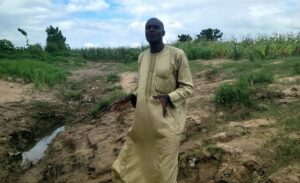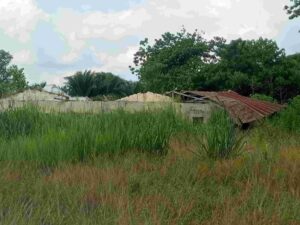In this investigative report, Safer-Media Initiative (SMI) reveals a stark disconnect between official statements and the harsh reality faced by the internally displaced persons (IDPs) still seeking refuge in Nasarawa state IDPs camps.
A gathering of children draws attention to Safer-Media Initiative’s reporter upon entering the Awe Pilot primary school premises. Curiosity piqued, before it became clear to the reporter that the children were fetching water from a makeshift water source—an open pond carved into a field within the school premises.
Here, in the midst of adversity, these children’s only option is to fetch unclean water from the pond to quench their thirst.
“People in the community don’t allow us to fetch water from their homes, and the only way to get water for survival was to source it within our reach because we are poor and don’t have money to dig a borehole,” twelve-year-old Samuel told SMI, as the other children shied away from the camera.
Samuel is among many other children taken refuge with their parents at the internally displaced persons (IDPs) camp in Nasarawa state. 
A child at the Awe Pilot School IDPs camp fetches unclean water from a pond
The IDPs situation follows years of continuous crises between herders and farmers in Nigeria which have left several people homeless, leaving a trail of displaced families. Among the hardest-hit are women and children, who bear the brunt of the crises.
The Awe Pilot Primary School is one of the places now transformed into a haven for those IDPs seeking refuge. As in Awe, many IDPs find shelter within classroom walls across various locations in the state, while others inhabit the skeletal frames of uncompleted buildings.
But the government says there are no IDPs in Nasarawa state
On May 1, 2022, the Executive Director, Nasarawa State Emergency Management Agency (NASEMA), who at the time was the Executive Secretary, Zachary Zamani-Allumaga, announced that more than 40,000 IDPs of the 47,675 IDPs recorded across the state in 2021 had returned to their ancestral homes.
He said the IDPs who returned were from the camps in Awe, Obi, Doma, Keana, Toto and Lafia local councils which according to him had recorded the number of the IDPs in the state.
More than a year later, SMI returned to the government agency, requesting that it give an account of the IDPs situation in the state.
Surprisingly, the NASEMA boss said the agency was not aware of any remaining IDPs within the state.
We pressed further, as SMI had already carried out preliminary findings.
Zamani-Alumaga said: “The local government chairmen of Awe and Keana did not notify us that the IDPs are still taking refuge in their local governments.”
He maintained that camps had been shuttered since 2022 and IDPs had successfully returned to their ancestral homes. But on the other hand, NASEMA took a contrasting stance by saying that the state government would deploy a dedicated team to conduct a comprehensive head count of the IDPs with a view to providing them with support.
This apparent tacit acknowledgment by the government hinted at a shift from their initial denial of knowledge about the presence of IDPs in the state.
The discrepancy between the initial denial and the subsequent mention of proactive measures perhaps highlights the fact that the government’s engagement with the plight of IDPs has been poor.
SMI’s visits to the camps
SMI’s visits to camps in Awe and Keana reveal a condition of suffering, particularly for women and children grappling with harsh realities, as they are exposed to unhealthy conditions, lack clean water, and lack access to medical care. The harsh pangs of hunger echo through the camps, adding to their many woes.
At the peak of the cold weather during the rainy season in August, when SMI first visited one of the camps in Keana, children were seen lying on a mat on the bare floor and visibly looking malnourished. It was heartbreaking. A scene that underscores the difficult reality faced by the IDPs in these camps.
 Children lying on a mat on the bare floor at an IDPs camp in Keana
Children lying on a mat on the bare floor at an IDPs camp in Keana
Some of the IDPs tell their stories
Heavily pregnant woman Charity Emmanuel told SMI that she is unable to feed properly and wonders how someone who has no money to eat will have money to visit a hospital for antenatal care or delivery.
“Most of us have given birth to babies on bare floors within the camp because we have no money to feed ourselves, not to think of money to pay in the hospital,” Charity told SMI.
When our reporter asked about her understanding of the potential risks associated with not giving birth in a hospital, she explained that, despite being aware of the dangers, the financial burden of hospital bills renders it an unattainable option for her.
Consequently, the only feasible recourse for these vulnerable women is to deliver their babies within the camp, a choice dictated by financial necessity rather than preference.
Another IDP who spoke is Grace Shima, a 45-year-old and the mother of four children. She began by telling SMI that two of her children—one dreamt of becoming a nurse and the second a lawyer—felt that their aspirations had been dashed after herdsmen killed her husband and displaced them.
Grace said: “Herdsmen killed my husband on the farm, leaving me with the huge burden of providing for the family’s needs. I am unable to enroll my children in school. I have no hope that they will fulfill their dreams of becoming a nurse or a lawyer.”
For Scholastica Isiah, she was doing well in her commercial ventures until the crisis made her homeless after her husband was killed. She now engages in menial jobs, which has made it difficult for her to care for her children. Adding to that, she said, the children often become sick in the camps amidst their exposure to unsanitary conditions, and most times she would use herbs for treatment as she was unable to pay for any hospital bills.
“Whenever we go to government hospitals, we are asked to pay a lot of money, and since we do not have much money to pay for hospital bills, we hardly go. Many women here, especially pregnant women, and a lot of children have died due to different causes,” Scholastica grieved.
Dr. Jude Yekpowudu is a medical professional at the Dalhatu Araf Specialist Hospital in Lafia, Nasarawa State. He spoke with SMI on the potential health risks associated with the poor sanitary conditions and the need to address and prevent health challenges within the IDP camps. He said the IDPs are prone to various diseases. These include typhoid, malaria, and a range of infections.
He emphasised the need for sustained health education, particularly for pregnant women, to avert attendant consequences that could endanger mother and child during pregnancy or delivery. 
IDPs take refuge in an uncompleted building in Keana
‘We offer free medical services to IDPs’—Awe General Hospital
SMI spoke with the Acting Chief Medical Superintendent of the Awe General Hospital, Dr Ikenna Obichefa who said, the hospital has a welfare package that offers free medical services for indigent patients. The services, according to him covers the IDPs.
‘It’s not true’—The Awe IDPs Camp Coordinator
However, Ezekiel Orkuha, the Awe IDPs camp coordinator, refuted the claim by the Awe general hospital. He told SMI that the IDPs are not aware of such a ‘welfare package’ as no official notification has been given to him that such services are available and can be accessed by the IDPs.
Ezekiel said: “That claim is not true! We have never received any free services from the general hospital because of our status as IDPs. I repeat, we have never.”
He stressed that IDPs are billed by the government hospital like any other patient. When asked if the government was aware of their presence in the camps.
”I do not know if the government is aware of our presence. I have never seen them in any of the camps attending to the needs of IDPs; they have never visited the camps,” Ezekiel stated.
He acknowledged that a significant number of IDPs have returned to their homes but lamented that the government has seemingly abandoned those who remain in the camps. The camp coordinator said any government official denying the presence of IDPs in Nasarawa State is not being truthful.
The government insists that there are no IDPs in Nasarawa State
SMI returned with its findings to the NASEMA boss, Zamani-Alumaga. This time, he asked this reporter to speak with the agency’s Director of Planning, Ibrahim Ahmed, who reiterated their earlier position that there are no IDPs in the state.
“Regarding the IDPs, presently we don’t have IDPs in Nasarawa State because all the camps have been closed,” Ahmed reaffirmed.
This report is produced by Safer-Media Initiative with the support of the Wole Soyinka Centre for Investigative Journalism (WSCIJ) under The Collaborative Media Engagement for Development, Inclusivity and Accountability Project (C-Media Project) funded by the MacArthur Foundation.



